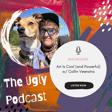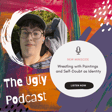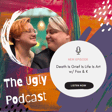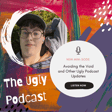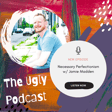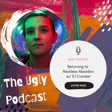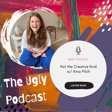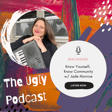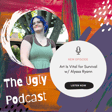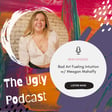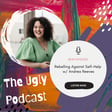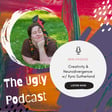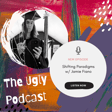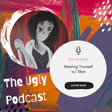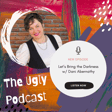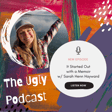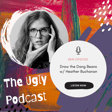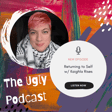Introduction to The Ugly Podcast
00:00:04
Speaker
Welcome to The Ugly Podcast, the place where creatives are encouraged to make messy, ugly art and to redefine their relationship to their inner critic. Every other week, I am joined by creatives of all mediums and methods to discuss our creative processes and how we navigate the mental minefield of creativity.
Embracing Artistic Freedom
00:00:21
Speaker
This podcast serves as a reminder that you and your art get to be whatever the hell you want to be. Ugly out.
00:00:31
Speaker
Uh, amazing. Uh, hi, everybody listening. Welcome back to The Ugly Podcast. I'm your host, Lauren Alexander.
Listener Engagement and Technical Issues
00:00:38
Speaker
I say them pronouns. And I have a little bit of housekeeping up front before we dive in. Um, one, I'm starting to do listener questions, which is very fun. And, um, so yeah, if you have questions about your creativity, if you have questions about like my creative process or you want to ask other artists what their creative processes are, like where you're getting stuck, um, all those things.
00:01:00
Speaker
Go ahead and email those to me, or you can DM me on Instagram. My email is Lauren at scribe and sunshine.com. And then my second piece of housekeeping is I had to do a bunch of businessy things and swap things around. And long story short, Spotify disappeared my podcast and I had to reappear my podcast on Spotify. And now all my lovely reviews are gone. So if you want to be super kind and lovely and go add a review on Spotify, that would be delightful.
Introducing Guest Tony Naj
00:01:27
Speaker
And I would love you all forever.
00:01:29
Speaker
Okay, that's that. Now let's introduce my awesome guest. So my guest is a stand-up comedian and content creator most known for her viral videos where she interpretive dances her philosophies while pontificating, gyrating, and questioning culture. She has 600,000 followers across her social media platforms. Not that she's counting. No one counts those things, right? No one pays attention to that.
00:01:52
Speaker
Her comedy is quasi radical, pseudo philosophical, somewhat existential and mostly funny. Observing Tony's work is like microdosing shrooms, but then an hour later wondering, wait, was that an actual micro macro dose rather? So welcome. Can you go ahead and state your your name and your pronouns for everybody? I like how you use the word state. I suddenly was like, oh, I must state my name. I'm Tony Naj. She her.
00:02:19
Speaker
Awesome. Thanks. Thanks for being here. Yeah, I'm really pumped. I also am really digging your curly bangs. Oh, thank you. Yeah, they are. They're they curly. They out there. How are you in this fucking world of ours?
Tony's Creative Journey
00:02:36
Speaker
Interesting question. I just got home from traveling last night at 1130 and was just, I think when you come back from Los Angeles to the East coast.
00:02:50
Speaker
It's always this massive shift of your psyche because I think LA is one of those places where does it exist on planet Earth? What is happening when you're there? It has such a specific, not only energy, but vibe. Then I get back and I'm East Coast, it's cold, it's wintery.
00:03:12
Speaker
and also the time difference. I'm still wondering why they do this mental psy-op of daylight savings. It's so bizarre. I do think it's just a mess with our circadian rhythms. It makes zero sense. I truly woke up so late and I slept. Sometimes I sleep this kind of sleep that is
00:03:33
Speaker
not only astral projecting, but it almost feels like a death, you know, and then you wake up, you're like, what just happened? Yeah. So that's kind of like recalibrating my nervous system to the East Coast. I'm processing these shows that I just did in LA. And then I just slept. Like I've been like, I feel like a bit of a newborn baby whose head is bobbling.
00:04:03
Speaker
Shitting everywhere. Yeah. Yeah.
00:04:08
Speaker
It's kind of like a lot of, I feel that way often, but extra today. Yeah, yeah. Well, thanks for being here amid the newborn babiness of all of that. Yeah, so you, your dances and just how your art in general I absolutely love and is very much aligned with my whole like ugly art philosophy of making art
00:04:34
Speaker
Not because it's gonna be quote unquote good or what other people like are gonna buy but just because it is what feels right to you and it is what.
00:04:48
Speaker
It's silly, it's weird, it's yours, and it's wonderful, and I love it so much. So I wanted to just kind of talk about where did this connection to your creativity come from? How do you feel about it in general? How has it evolved in your life? Yeah, so let's just start there. So how has your creativity evolved through your life? Well, I went to a type of
00:05:17
Speaker
school growing up that was very academic focus and very sports related and people, you know, often shopped at the gap. So I went to like a place that was
00:05:32
Speaker
quote unquote liberal in its politics, you know, most of the people were Democrat, Democrat, I mean, these are all quotations, you know, but like I grew up with in this liberal framework. However, everything was also very socially conservative in its own way, there was this like status quo that existed, like no one was like, let's talk about revolution, or let's talk about expansive art.
Motivation Beyond External Validation
00:05:58
Speaker
But again, this is a lot of
00:06:01
Speaker
A lot of these conversations just like culturally weren't even happening in the 90s in a certain sense. Like, people weren't speaking about white privilege as much. You were kind of speaking about race in a certain sense. But as if like, oh, the South are racist and up here in the north, like all that problem evolved evolved. So there was a lot of I think self righteousness also that I'm saying
00:06:26
Speaker
And I never thought of myself as a creative person for my whole childhood and into college like it just
00:06:36
Speaker
No one was really prioritizing that. If you were the type of kid that your parents weren't bringing you to classes, all you had was the access of what you were exposed to at school. I didn't grow up with the internet. I couldn't just be like, oh, I'm going to learn dance now by watching tutorial. None of that was accessible. So if your parents didn't bring you places, that was your world, kind of, except what you explored. So I always danced alone in my room.
00:07:05
Speaker
That was something I did, I think as an antidepressant, but I think my mom brought me to a ballet class when I was like six and they were like, oh, that chick's too tall for ballet. And my parents were like, okay, we'll never do that again. All right, bummer. Here. Too bad for you. Weird move, you know, I could have just liked it or something.
00:07:23
Speaker
So I guess long story long is that I didn't have a lot of exposure to my own creativity or to like a creative process for my whole childhood, teenagehood and collegehood, you know, except in colleges that when I started to dance, the only reason I started to dance in college was because
00:07:45
Speaker
I didn't have sports there. I went to the school called Sarah Lawrence and I had no idea my mom wanted me to go there and I was like, okay, whatever. I wasn't too passionate about where I went to college, which is obviously a privilege that I went to college. I'm aware of that, but my parents are both academics. In order for them to continue to love me, they were making sure I went to college.
00:08:14
Speaker
that was not negotiable. So my mother chose Sarah Lawrence, which is a very artistic school. Interesting choice. And then she kind of threw me in there and I was like, wait, what? And I was surrounded by all these artistic people. And that's when I started taking dance because I needed to move my body and there weren't any sports for me to do. And I was truly the worst person
00:08:37
Speaker
the entire time. Like I was the worst and every class I took I was the worst because most of these was mostly girls but there were some there were some boys as well but like most of these people had taken dance their whole lives.
00:08:53
Speaker
And then I was there being the worst and confused constantly. I know I was always confused. And so I think that was a very interesting bootcamp was to be not a child, you know, to be like, you know, when you kind of like become a teenager, it's like AI becomes sentient. And you're like, yeah, yeah. And like, this is humiliating in a certain sense. Like, I wasn't unaware that this was embarrassing. I was very, yet I just kept doing it.
00:09:23
Speaker
And I guess that my point is, is that there's something really interesting about being the worst. Yeah. Oh, absolutely. Like leaning into that kind of cringy feeling. It, it kind of eventually leads you to like, find yourself, I think it like shows you what you are made of, and what you have to say. And you really forces you to like,
00:09:50
Speaker
Find a different motivation. My motivation was not external validation. No change. It was beautiful work. They were always like, ugh. It was rough. There was no external validation that I was going to get, except probably as a senior. They were like, wow, you suck less than you did when you got here. That was probably the best they could have offered me.
00:10:16
Speaker
was like, you progressed, you know, like, you're still bad, but you're better. I'm like, cool. Thank you. Thanks, guys.
00:10:26
Speaker
So I mean, that was like a very interesting process because I think when outside validation is something that we need in order to create art, it's going to be not only extra painful, but I do think it's gonna sometimes make you artistically impotent.
Imperfection in Art and Life
00:10:47
Speaker
Oh, absolutely. I, I for the longest time, so I also did not think I was creative forever. And
00:10:55
Speaker
Like I always thought that like art was created for approval from other people. Like that was just like what was in my head of like what being an artist meant of just like, Oh yeah, you make art, you sell it. And that is how you are an artist. And like did not comprehend the internal piece of creativity until I started intentionally making ugly art. And then slowly I started realizing like, Oh, I get it. This isn't for other people. This is for me.
00:11:26
Speaker
Yeah. And it's like, it's for other people in the sense that the art you create can spark. Oh my God. I just saw a bald eagle. Isn't that cool? Sick. Yeah. I knew it. I was like, Oh, I'm going to see a bald eagle right now. And I did.
00:11:47
Speaker
It's like art is to be shared in a certain sense, as all we are human beings that live in community, right? And our intention in community is ultimately around like connection and I think furthering of consciousness.
00:12:03
Speaker
So art is for the self in terms of the process, but there also is community involved in creation. And your art doesn't have to please people. Like, I think it's like when we have the expectation that art is to please others, that's when we get trapped. But is your art creating conversation is your art inspiring consciousness, you know, is your art
00:12:30
Speaker
asking people to question their own relationship to their consciousness, even if it's uncomfortable, like that, I think, is part of art. It's, it is for the self, but it also is for community. Like I do, I think I'm really trying to re re establish like the importance of community in our individual American culture. Yeah. But, but it's like interesting, like all of
00:12:58
Speaker
All of the examples of community are also really rooted in conformity. So how do we have community without conformity is where I'm most interested. Yeah, I've been thinking a lot about community and the way that individualism has really broken down what it means to be in community and how we don't really know what that means anymore. And I love the idea of community not being conformity, but
00:13:30
Speaker
And I think this is where creativity can come in as like a really cool place where we can learn this together of like whatever we are doing doesn't need to be perfect or conform to what has always been. It can be something new and different and weird and we can explore that together and find community that doesn't rely on doing what has been done or doing something the right way, if that makes sense.
00:14:00
Speaker
Yeah, and I think like working hard at something and growing as a artist is important. You know, there is something like there is a way in which I've, you can kind of have like an attitude of, well, I did it and that's enough. Mm hmm.
00:14:23
Speaker
sort of, you know, doing it is enough. And, you know, it's kind of like, and as human beings,
00:14:32
Speaker
we are put on this planet to evolve. And not just as a species, but as a person, like you are born and then you grow. And part of that growth is your own consciousness evolution, right? And I do think that we have to apply that to our creativity and to our art is that, you know, it's like when we stagnate emotionally, when we stagnate spiritually, and when we stagnate creatively, it's,
00:14:59
Speaker
It's going to turn in on yourself. You know, you can almost sit with people when it's like, how do I, how do I put this? Um, it's like someone who like maybe only performs stoned or something. I don't know. So I'm just an example. So then you go up on stage and you're like, I'm high, you know, so whatever I'm high and that's cute and it could be fun and it could be an interesting thing to explore.
00:15:23
Speaker
But if you're always high, and then you always have this thing to fall back on of like why it wasn't better, was high, you know, like it was fine, then that also has its own stifling. You know, it's like, I think we have to have personal expectation of growth. And that is something that's really important. And but that is different than societal or like parental expectation of growth.
00:15:47
Speaker
Yeah. So it's like, yes, we need to like put things out and not have it be perfect. But yes, we also should always be kind of growing evolving and getting deeper and wider and more interesting and more complex. And maybe more complex is sometimes being more simple.
00:16:01
Speaker
Because that could be complex in its own way. But just not letting oneself just like, be satisfied with mediocrity just because like I did it. Also being satisfied with mediocrity because that also is interesting. It's not what we can keep kind of going in.
00:16:21
Speaker
and dancing around this, but that I think is the point. Yeah. Well, and you bring up a really interesting thing because I have thought about this so much with like this podcast specifically because I called it the ugly podcast with the intention of, I don't know what I'm doing and I need to call it ugly because it's going to be bad and we're going to talk about ugly creativity and like that is bad. That is what it is. And like as
00:16:44
Speaker
Also, as someone who is deeply perfectionistic, I always want to make it better. And so I was I was joking with somebody who the person who broadcast this podcast on a local radio station was like, man, you got to change the name of this podcast. It's not so ugly anymore. And I'm like, I know, but like that's.
00:17:04
Speaker
But like, that's the point is like, I intentionally, my art practice started, it had to start from a place of I have to make it ugly so that it can be created in the first place to overcome that perfectionism. I had to start there. But like, as I've evolved my creative practice,
00:17:23
Speaker
like ugly is no longer, it has a new meaning for me, I guess, because I'm always pushing myself to like, do things better. But then there's always this thing in the back of my head of like, it can be bad. And I think that it can be bad is like a really good reminder of just like, yes, seek to be better, always, always push yourself to evolve and do better. But like, it's also worth your time if it ends up being trash, and that's okay. And that's wonderful. There's like this, like nice balance between the two, you know,
00:17:53
Speaker
Yes. And I think this is a metaphor for life, right? It's like we're always trying to be our best selves. And then there are times when that is, you know, whatever's going on in our nervous systems, or our hormones, or whatever exposure we've had, or traumas that we're re envisioning, like,
00:18:11
Speaker
we're not always going to be our best selves. And we're not always going to be our best artists, we're not always going to be our most creative and like leaving space for that waxing and waning. But I think like what you're saying is you wanted to get started. And I think that's what
Deep Motivation in Creativity
00:18:24
Speaker
has to happen is when we get started, our standards have to lower because we are getting started at something. So you can't have unrealistic expectations of your own standards of
00:18:37
Speaker
anything when you're beginning, you know, that's being humble. It's like I have to start in the beginning. Just like if I were to, you know, say I wanted to get really good at guitar, I've never played guitar, I would have to do what a six year old does when they're learning guitar or whatever, I have to go back to the beginning. And I think that that humbling is really crucial. And when we talk about the concept of perfectionism,
00:19:04
Speaker
perfectionism is merely, you know, self abuse, right? It's and it's also the perfect framework of which to not do anything. Mm hmm. Because you're like, Oh, it's not good enough. So but having no standards for yourself also is its own thing, because then you're kind of your
00:19:29
Speaker
you're not challenging yourself. So yes, it's like this dance of letting go of perfectionism, but inviting in personal challenge, you know, inviting in reflection. I think that's like my personal biggest advice to anyone is self-reflection in life must also exist in your art. Yeah, absolutely. One thing you made me think of, so there's this book,
00:20:00
Speaker
Can I remember what it's called?
00:20:03
Speaker
Nope, it's gone. OK. But anyway, in this book, it talks about kind of reframing perfectionism as a superpower and then putting it instead of just perfectionism as holding you back or perfectionism driving you forward, there's maladaptive and adaptive perfectionism. Maladaptive being that state where you are so perfectionistic that you can get nothing done and you do nothing and you're so hard on yourself and other people that you are just ruining
00:20:31
Speaker
your life and the lives of people around you and then adaptive being that perfectionism where you are okay with failure you are okay with making mistakes along the way in the pursuit of that beautiful perfect future that you have envisioned for yourself.
00:20:48
Speaker
Because we can have those really beautiful goals and those big, beautiful dreams for ourselves. And our perfectionism can be a motivating force to continue that personal challenge, like you were saying. Motivating yourself forward as long as we don't let it become the maladaptive version of it where we are stuck. I really enjoyed that book. And I'm upset that I can't remember the name of it. But I will put it in the show notes.
00:21:11
Speaker
That's almost like everything is this opposite, right? So let's think, you said the word goal, being goal oriented versus not being goal oriented. So one would make the assumption that someone who's goal oriented needs to achieve their goals. And someone not goal oriented does not need to achieve their goals. So it's almost like a perfectionism, not perfectionism duality.
00:21:38
Speaker
Someone who, anyone who's actually goal oriented knows you do not always achieve your goals. So being goal oriented means that you are actually comfortable not achieving your goals because that is the nature of having a goal. You do not always achieve it. Not being goal oriented means you are actually obsessed with your goal because you've achieved your goal of achieving nothing.
00:22:06
Speaker
So it's like you would think the goal oriented one is more obsessed with goals, but they're not. They're actually more flexible. And the one that's refusing to be goal oriented is actually very rigid because they're always achieving their goal of no goal. You know, and it's almost like we can look at any kind of these extreme ways of being.
00:22:30
Speaker
are actually also their opposite. You know, like someone who's like a real perfectionist in a certain sense also knows nothing is ever perfect. You know, like they're actually more comfortable with the lack of perfection in a certain sense because they have really thought about it more. I am not a perfectionist and so maybe
00:22:59
Speaker
there is a part of me that truly is. Do you get what I'm saying? That is where we can laugh at ourselves. And what you were kind of mentioning as this concept of a superpower, right? And so, you know,
00:23:17
Speaker
There's a lot of ways, I think, in our 20s and our 30s, like these phases of life where we fight against our own nature and we have these ideas as if our, you know, I have to change. That's what people are always saying. I gotta change this about myself. I gotta change this. Oh, New Year's resolutions, I wanna change, change, change. I would argue no one has to change anything.
00:23:45
Speaker
We are all perfect the way we are because we all share massive emotional complexity. But what we can work on is the volume level of which these different things are turned up in our lives. So anxiety as an example. Anxiety is an important emotion to drive people to action.
00:24:09
Speaker
Because I'm like, Oh, I have this show coming up, I'm feeling anxious about it. I really have to promote my show. And that anxiety of my show and the anxiousness
00:24:20
Speaker
created the action for me to promote the show. But sometimes the anxiety is so overwhelming, and then I'm like, oh no, I can't do anything, I have so much anxiety about the show, and then I don't do anything, and then that's a problem, right? So the anxiety isn't the problem, the volume is the problem. Yeah, I really like that imagery.
00:24:40
Speaker
And like, even with something like depression, like, I have had lots of experience with depression in my life, right? And a lot of those times are very important. They were very important to just kind of like, really just like sit and be that vibe, you know, like this work was happening. But the volume at certain times was it was turned up too high, you know, and I
00:25:06
Speaker
I've really kind of been working on like, Oh, like this, like depressive state is actually this time when I have unresolved emotions, and they have been depressed, right? And so I have to defend the space, I have to be bored, I have to be unstimulated, I have to do, I have to literally carve out time in order to process
00:25:29
Speaker
emotions I've been avoiding processing. You know, so again, it's it's like, but am I ever gonna know no more depression, no more anxiety? Like, no, these are all actually very crucial aspects of the human experience. I would say the same thing with perfectionism. I'd say the same thing with procrastination, like sometimes procrastinating is important because you're still mulling it.
00:25:51
Speaker
So if you're so I've been like, I guess it's the concept of like trusting the divine, you know, like I've been doing a lot of this stuff for like many, many years. So I've now I'm at this place where I'm like, I'm trusting in the divine timing of things. And rather than like beating myself up that I'm procrastinating, I'm going to say like, no, like, this is brewing, I'm a witch, these ideas, and it's not time for action, it's time to brew.
00:26:20
Speaker
And like some I've had moments where like I literally had an hour long show that I was going to perform. And it was Wednesday and I hadn't written the show, you know, and I was like, I gotta fucking write this goddamn show. Like the meme of that like typing cat I was like, I wrote the show, you know, like what I always suggest that process like not necessarily but it was it was valuable for that show. Yeah, yeah.
00:26:47
Speaker
Yeah, I don't know. I think I'm just trying to say is like, if we need to fight against ourselves, let's have more trust in ourselves, but also, but I've also been doing this for a long time. If someone's just starting out, you can't just like trust that you're going to come up with it. You're just starting out like, no, no, no, no, no. You got to like not do that. You have a different process, which is like, you got to chip away at it every day for probably a couple of months before you're going to do it.
00:27:17
Speaker
So I guess that's a different conversation. Yeah, it's good. Yeah, I I just I love I love how this is becoming much more mainstream this idea that you're not broken and that you don't need to get rid of these parts of yourself. You you have these parts of yourself within you and
00:27:39
Speaker
Yeah, maybe they need to be turned down. Maybe you need to observe them a little at more of a distance. But a lot of these things are just a part of you. And it's OK to just be human in that experience of being a perfectionist or procrastinating or being depressed. It's OK to just exist there. You're not broken. And I think that's one thing that my creativity has
00:28:05
Speaker
expanded for me, I guess, is it took me from a self-help, self-improvement model of my life into a creative, let's see what is here and let's see what I would want to be here and let's invite things in instead of trying to like push things out of my life, you know.
00:28:27
Speaker
Absolutely, because I think what we have to fully embrace is the fact that every single personality trait emotion way of being has an exalted and a kind of more like
00:28:44
Speaker
I don't know, I'm going to use a buzzword of like toxic or something or like sepsis, like a septic kind of like attribute to it, you know? And that's everything. Everything has like a wide spectrum of how it's going to either serve you or hold you back. All right. And I think that like when we investigate, you know,
00:29:10
Speaker
how we can like dance on the rainbow of these different personality traits that we have. Like, okay, great. Here's a person, I'll just use myself an example, right? A personality trait I have is that like, I am bossy.
00:29:27
Speaker
I'm a bossy person supposed to say that as like a feminist, but like I'm boss. I'm a bossy person. And there are ways that that is like not going to serve me. And there are ways that that is going to be like really advantageous and service settings. And so rather than being like, I can't be so wussy. No, it's like I have to know my audience. I have to know I have to harness like every single attribute I have. That's like a
00:29:50
Speaker
I'm like a jockey and I must know when to harness it and then no one to put it in a stable and then no one to like ride another thing. I'm also can be very sensitive. I also like have a lot of things to say. And so I like to say things but sometimes I need to shut up. You know, I can't always you know, so it's like I have to be I but I don't hate myself because I have a lot of say I can just I'm very opinionated and I also have no opinions.
00:30:18
Speaker
So, and I guess like the other thing I wanted to say, um, was you were talking, what were you talking about? You were just talking about something. What were you talking about? Uh, I was talking about like how there's no bad parts of us. Uh, and then self-help. Oh, I know. Self-help. Yeah. Okay. Self freaking help. So when I think about motivation, right?
00:30:48
Speaker
your motivation has to have deep meaning or else you're not going to want to do it. Like there are a lot of people that I meet and I'm not like trying to be rude, but they want to want something. Like they want to want to be a writer or they want to want to be an actor. They, you know, but they don't actually want it. And so wanting to want something is its own torture.
00:31:17
Speaker
And I really do suggest that anyone that's like, like, I really want this, but I just can't seem to do it. Like you need to ask yourself first, do I want to want it? Because when you really want something, it's different than wanting to want it. So that is like one thing that I, I'm just throwing out there. The other thing that I want to throw out there is that it's like a creative process or creative energy.
00:31:46
Speaker
It's gotta come from something very deep inside of you. And I personally believe that that is meaning. There must be meaning to what you're doing. So when I like work with people in their bodies, I'm a dance teacher. I've been dancing for a long time. I'm a dance teacher. I know a lot about like anatomy and alignment and blah, blah, blah, right? So I can talk about like, or aesthetic, like let's think about your stomach, right?
00:32:11
Speaker
If your motivation is like, I'm a six pack or I want a flat stomach, that is like motivation on a certain sense. And like some people could use that motivation to like do the things like make their stomach flat. However, if you were to look at your stomach and you were like, I really want to be connected to my core, I want connected to my sense of self. I want to be connected to like.
00:32:39
Speaker
like the power in me that's possible when I am energetically aligned and I am like standing so my spine is aligned.
00:32:47
Speaker
And I have my chi flowing in a way that I feel like I'm fully present in my body and in this space. To me personally, that is a lot more motivating than an aesthetic. And so when I approach my body and when I approach working with people on their bodies, I really try to get into the deeper
Creativity for Personal and Societal Liberation
00:33:10
Speaker
journey of the body and like why we would want to move it because that motivates me to do 700, you know, pushups or whatever much more than like, I want to be sculpted. And that's been on someone who wants to be hot. I'm really not like some people want to be hot and like, God has blessed them. Like, it doesn't get me like wet, you know, like I want it wrong. So I can like express myself. And that's what motivates me.
00:33:37
Speaker
So I think like, really sitting with like, why are you doing this? Like, what is motivating you is a very important part of the artistic process. And sometimes that is like, I'm doing this to heal, I'm doing this to know myself better, I'm doing this to explore a part of me that like, I don't understand. And I don't need anyone to ever look or criticize or like participate in my art.
00:34:01
Speaker
because I'm doing this to get to know myself better. And that is fully significant. And that is a spiritual practice. And I think ultimately creativity is spirituality. And it's about finding meaning in life. And it's about exploring meaning in life. And it's also about taking your pain and your joy and your emotional self and creating meaning from it. When anything happens to me in my life, that sucks.
00:34:30
Speaker
I'm like, Oh, that sucks. Tier, tier, tier. But also like, Ooh, what can I do with this? You know, how can I make art from this? And that makes my life meaningful. And the same with a spiritual practice, you know? Yeah. Yeah.
00:34:48
Speaker
It's just really good. It's lovely talking to you. Okay. I don't know if we'll have a ton of time to get into this, but I would like to talk a little bit about using creativity as a tool for liberation, both for ourselves, for each other, for society, for the world. Let's get into it. Makes me so excited. All right. One of these quotes,
00:35:17
Speaker
It's like people could sooner, I'm gonna butcher the quote, but the idea is like, it's easier to envision the end of the world than it is to envision the end of capitalism.
00:35:27
Speaker
Hmm. Okay. Whoa. Yeah. That is an imagination problem. That is a creative problem. Like fuck that. Like I mean that from the bowels of my soul. Like fuck that. I personally can imagine like 7000 other ways to self organize that does not depend on this capitalist hellscape that we currently have going on.
00:35:53
Speaker
you know, so the reason why creativity and imagination is so important is because we need to bring that to how we self organize, we need to bring that into like how we work on buildings, how we have sustainable living, how we distribute food, like creativity, just about like, I'm going to paint, you know, like, you can be very creative in how you operate your business or how you cook or how you care for others like,
00:36:21
Speaker
Creative life doesn't mean you're even producing anything. Yeah, exactly.
00:36:27
Speaker
you can interact with people in a way that is just like shocking them out of the everyday norm and that is creative. You know, you could go to the grocery store and have like a deep conversation with someone and that is creative because you're pulling them out of like the mundane. So I guess my point is that creativity is the most crucial aspect of our self-organizing principles and how we come together and imagine a new world
00:36:56
Speaker
is based on our ability to be creative. Why do you think creativity is taken out of the schools? Why is art the first thing to go? They don't want imaginative kids questioning society. Are you kidding? We don't have them doing watercolors and they're going to care about nature and they're going to be concerned.
00:37:16
Speaker
You know, it's like, there is a war against art, there's a war against creativity, and there's ultimately a war against beauty. Because when we really notice beauty, it is not in like someone's tits, or their plastic surgery face, it's in a fucking blade of grass, like beauty everywhere, beauty is in wrinkles, beauty is in the soul of a person's eyes, you know, beauty is, I mean,
00:37:42
Speaker
huh. So it's against our Tony against me because that is how we are controlled. That is how we are basically put into this place where we will say, Oh, yeah, I'm going to spend my life in an office rather than at a waterfall.
00:37:58
Speaker
Mm hmm. Yeah. And our survival is so connected to that. Like, because we are integrated into this, our I guess I should say our presumed survival or how we believe how we connect our survival is, oh, I have to conform to this. I have to go to this nine to five job. I have to I have to live this one kind of life in order to survive within this capitalist society. And we forget to imagine what is beyond that. What is
00:38:28
Speaker
what is more important than that, who we are underneath that. It is so easy to kind of lose ourselves in the process of capitalism and like art can help us rediscover that and find that again. Art will constantly question that, yeah. Yeah. And it's like even like, I was just thinking about this like, yes, last night, you know, because
Exploring Local Environment and Nature
00:38:54
Speaker
I got stoned. And we were talking about it. It was like, this concept of traveling, right? I think it was because Oh, the TV was on and you know how like that there's like the TV was on but off like we weren't watching TV. Yeah, like the photographs that like cycle through the television that Apple produces, right?
00:39:14
Speaker
And I'm looking at these photographs. I'm like, wow, I have no fucking clue where this place is. Like I have no fucking clue where this place is. The only place I recognize, I was like, oh yeah, that's the Brooklyn Bridge. And then I was thinking about this concept of like traveling the world, right? And I'm like, wow, you know, and there's so little of the world I can see. And then I was like, wait a minute, there's so little, I live in New Hampshire. Do you know how little of New Hampshire I've seen? Do you know how little of my woods in the back that I've actually truly investigated? It's almost interesting, it's like,
00:39:45
Speaker
It's like deep depth versus width, right? And I was like, oh man, I should travel the world. I'm like, wait, should I or should I just travel my fucking backyard? Yes, I haven't thought of this yet. Literally just get to know every inch of my woods and that would take a lifetime.
00:40:02
Speaker
And it would be constantly changing too because we have seasons here and then like, oh, this tree fell down and there was a storm and blah, blah, blah. And it's almost like there is like this like sigh up around globalism where it's like, oh, we got to know the world. It's like, do you even know yourself?
00:40:19
Speaker
Do you even know the person you live with? Do you even know your child? Maybe we actually should go nowhere and do nothing. I think that's what the monks are doing when they're like, no, I'm just going to be in this fucking cave. There's a lot going on in this cave. If you even sat in one place in a yard for the next three years, the different things that would pass by you completely fucking still
00:40:44
Speaker
would be profound. And yet everyone's like, I got a jet fuel or a Taylor Swift. She's like, how did jet fuel around the world? And it's like, maybe we don't need to drive or fly anywhere. I don't know. I don't know what that is. It's all distraction.
00:41:02
Speaker
telling that idea that we need to go see the world and go away to find peace and find excitement and exploration and adventure that we have to leave in order to do that, it's a distraction because then we're not paying attention to where we are, which is a fucking capitalist hellscape. Yeah, completely. Completely.
00:41:26
Speaker
future Lauren here. I had to jump in here and say no shade to my fellow travel lovers. I am someone who loves traveling and has traveled a lot and this has been on my mind as a way to be present in my life as it is here and now instead of romanticizing only what is far away and inaccessible. So if you feel a little called out here just know that I'm calling myself out too and this is something that I am working on as well. Okay back to past Lauren and Tony.
00:41:52
Speaker
Like, yeah. So, I mean, I think there is something to be said about like complete fucking stillness as well, you know? And like really exploring where you are, really exploring your community. I mean, there's so many people who I do not know and I live in the woods, you know? All these people I don't fucking know and I don't care to fucking know you. Who the hell are you? But I'm like, wait, why am I like that? Like maybe they're interesting. Maybe they're boring AF, you know?
00:42:19
Speaker
But it is interesting how little I know about where I am if I'm being truthful. And oh, I was also thinking about this. It's like sacredness, right? Having sacred relationships to land, which I do think is part of creativity. I do think it's part
00:42:34
Speaker
So there's a mountain that is right a mile for two miles from me. I've hiked that mountain. I have a relationship with that mountain. I hiked that mountain every year. I've hiked that mountain on mushrooms. I've hiked barefoot. I've hiked it on every season. I have a lake right there. I swim in that lake at night. I swim in it in the morning. I have deep relationships with a mountain and a lake. Much deeper than if I were to go to the Himalayas, which obviously is a very spiritual place.
00:42:58
Speaker
But I would never have the same connection that I do to this land that I'm here at. And I think that that's also part of the SIOP is thinking that
00:43:12
Speaker
Being connected to the land where you are isn't significant. It is so significant. That is your spiritual practice. And if you live in an urban environment, maybe that is just the tree popping from your street or the grass coming up from the sidewalk. But you could have a holy relationship with that grass. And that is part of your art as well. Yeah. I think that's also part of unlearning
00:43:44
Speaker
inner colonization and just the effects of colonization, I guess, on ourselves, because we don't have that connection to the land. I remember I was talking to somebody about this dread about climate change. And the comfort that I have comes from kind of this nihilist perspective of, well, I mean, if all the humans die, at least the Earth will keep going and the things will keep budding.
00:44:01
Speaker
and shedding kind of the...
00:44:12
Speaker
the earth will heal itself. And they were like, that's actually kind of a problematic way of viewing the world and our connection to it. There are indigenous tribes do not think like that. They think of, no, we are connected to this land. We want to steward this land. We do not want the land to go on without us. We are part of the land. There is this disconnection, I think, that we have learned of just like, ah, yeah, I am separate from the worlds.
00:44:40
Speaker
And that kind of allows these systems to perpetuate. And so reconnecting to the land is part of liberation. It's part of shedding that colonization setting, shedding that capitalist mindset that we are separate.
Respecting Earth Beyond Patriarchal Views
00:44:58
Speaker
We are not. We are all one with the earth.
00:45:02
Speaker
Also, we are children of the earth. Why would the earth want us gone? What the fuck? What are you doing? I made you be with me. It's so funny you say this because I was talking about this with my cousin.
00:45:25
Speaker
the other day, because I have an aunt who's just like, fuck all the humans, like they all should die. You know, like, I don't give a fuck. And it's it's like, I'm like, Oh, well, that's a perfect excuse to never give a shit either. Yeah, it is. And like, it's also it's almost like I have a kid, right? And if my kid were like, well, fuck you, you know, you don't care about me. I'm out of here. I'd be like, I can't.
00:45:50
Speaker
I love you, it would kill me if you died. We don't know that the earth wouldn't mourn our death to a degree where it just shriveled up and I would shrivel up and die if my daughter died at this point, especially by just like, you know, like,
00:46:08
Speaker
committing collective suicide, which is like what it seems like we're doing, you know, like, I would be so sad, like, we don't know the earth won't mourn us. No idea how the earth will look like we have no idea how the earth would feel. She might be sad as fuck. And I also do have to say, I think it's kind of like, this is just another point. But I always think about like, how like,
00:46:32
Speaker
is calling the earth mother earth an excuse to abuse her. Like would we act the same father earth, right? In this patriarchal society, maybe not like when we were like, ah, goddess worshiping and stuff. But there is a way, it's like we disrespect the mother, we disrespect the earth, we act as, we take advantage. It's like this, like that fucking tree, that goddamn fucking tree story that we were all told. The giving tree, yeah.
00:47:00
Speaker
fucking fuck that story up. Like fuck that story. I hate that story so much. Yeah. You know, it's just the martyr mother. It's like the murder fucking planet is just like no mother is fierce mother is raw mother cares to like she's like breastfeeding us with her oil constantly. Mm hmm.
00:47:22
Speaker
And we're like, you know, and then, I don't know, you get it. Anyway, it doesn't create a thought, you know? This is where creativity is important. Yes, yes, exactly.
00:47:35
Speaker
Uh, yeah, I, I love it. I think there is so much opportunity for us to embrace creativity and unlearn so much of this. And I think I have, I have more hope now because I've seen this transformation in myself from growing up in a very high control religious conservative environment. And then eventually crawling my way out of that and
00:48:04
Speaker
I mean, even years after, finally finding a connection to myself, a connection to the earth, and the only way that I found that was through a creativity practice. That is how I found out I was queer. That is how I found out what my goals in life are, how I found this purpose for myself.
00:48:28
Speaker
I think there's just a lot of hope for creativity to help liberate all of us personally so that we can, we can liberate ourselves collectively. Hell yeah. And you had to have the imagination to picture yourself. Like you like felt like, ah, there's something going on in me. And I am opening up the channels of imagination. Yeah. Recognize that like, oh, I am not, um,
00:48:53
Speaker
I am not the socialized person that my parents were constructing. I am not their clay. I am having the imagination to remold myself into a different configuration. And that configuration is unique to me at this moment. And it's different than the way I was molded.
Consistency in Creative Practice
00:49:23
Speaker
Oh, okay. We're quickly running out of time. So really quick. Uh, what, I swear I could talk to you for another hour. Um, so one of the listener questions I had is from my good friend Fox Welsh and they ask, what are some tactics you use when showing up to make anything feels overwhelming? Okay. I think I'm going to make, um, a parallel to meditation, right? So I have a meditation practice that I've had, you know, for
00:49:53
Speaker
decades and, um, or for 15 years or something. Yeah. 15 years. I meditate every morning and I meditate every night and I do that. I don't always do it for the same amount of time. You know, like in a perfect world, it's X amount of time, but like sometimes I only have Y amount of time, but I show up and I do it every morning and I do it every night. Right.
00:50:16
Speaker
And sometimes I'm sitting there and I'm just like thinking or spinning out or blah, blah, blah. And sometimes I'm in a more like meditative space. And sometimes I'm like, well, I'm transcending space. I have no idea what's going to happen. I can't predict what's going to happen. I don't have an expectation of what's going to happen, but I show up. I show up to the practice.
00:50:41
Speaker
So I'm a Capricorn, that is something that I can do. I can have a regimented schedule. And for me, a regimented schedule means that I'm putting in the space to show up, right? Not everyone loves schedules, not everyone loves regiments, whatever, whatever, but you carve out time to show up. And maybe sometimes that is you kind of just sitting there. But you don't have your phone, you don't have your thing,
00:51:11
Speaker
you just say I'm giving myself this hour to do this. And like, maybe it's just an hour and you just literally sit there for an hour. I don't know. But like probably and maybe you do it and you like create something that's kind of like, but you showed up you showed up to it like not every time you show especially when you're getting into something, you know, it's like
00:51:31
Speaker
I've done my 10,000 hours. And so like, I'm kind of playing in different waters now, you know, but when you're still gathering your 10,000 hours, some of those 10,000 hours are gonna be fucking garbage, you know, but you still show up to be part of the 10,000 hour journey, artistic process, you know,
00:51:49
Speaker
So I think that's really it is showing up and not having an expectation of what's going to come out and being comfortable with fucking boredom. These goddamn phones. These goddamn fucking phones the second we get bored in the line in the bank. Oh, this you get to a stoplight. Oh, you know, you're like a report. Ah,
00:52:09
Speaker
Fucking look at people. Be awkward. Look at people. Just look at people in line. You have got to force yourself to be bored. You've got to force you. Go for a walk with nothing. For an hour. Yeah. Boredom is such a powerful tool. I love it. You have to, at this time of life, you have to carve it in. You literally have to force yourself to make time for your board. You have to make time to just be like, ugh, and not like it, you know? And so when you sit down and do your creative, whatever it is,
00:52:40
Speaker
You got to have your phone in a different room. For sure. You got to do it. And even if you gave yourself two hours, and even if the whole two hours, you do fucking nothing, you have to just do nothing. I'm sorry. That's going to really help you. Yeah. I think I would also ask, what is the overwhelm from? Because sometimes other things do need your attention at any given point in time. Is the act of creating overwhelming? Or is what's going on in the world overwhelming?
00:53:10
Speaker
I guess what is the overwhelm one? And then two, you can use the overwhelm. I think overwhelm is a really powerful tool in creativity, personally. If I'm overwhelmed and I still sit down to create, usually what I create helps ease the overwhelm.
00:53:33
Speaker
Yeah, and also I would almost go as far as to argue like carve out a separate time to contemplate the overwhelm. But when you're actually just saying I'm gonna do my creative practice, try actually not to think and feel. Because the truth is we don't think ourselves out of anything. We think we do, but you don't. You feel your way out of things.
Ugliness in Comedy and Art
00:54:03
Speaker
through action. You have to we have to think obviously, but like, we have to feel more. So it's like, I think your advice about contemplating the overwhelm is important. But do that before or after, you know, maybe. But like, really, while you're sitting down to be creative, it's like, you have to, or you don't have to do anything, I'm just suggesting, you know, the mind and the the mind has to
00:54:32
Speaker
flitter. It doesn't, you know, like, it doesn't need to like zone in on like, why is this so hard for me? It's just like, actually just like feel your body or like, Oh, what's going on with my nostril or like do another mindfulness practice. I mean, there's like 10,000 mindfulness things one can do, you know, even if that mindfulness is literally staring out a fucking window and having no agenda with thought. I think the agenda with thought is where we also anytime I have an agenda with my thoughts, I'm like,
00:55:04
Speaker
Insight comes when you're taking a shit. Insight doesn't come when you're like, what's the answer? I do think it's important to do that sometimes. I'm not saying don't do that. I'm just saying don't do that as part of your creative process. For sure. I think that's a really good distinction.
00:55:25
Speaker
I like that a lot. Yeah, but definitely do what you're saying. Yeah. Yeah. Yeah. Just like in a separate time. Yeah. You got to carve out time for that. Yes. You need two separate hours. I actually, I think I'm correct though. I mean, like I know not everyone likes schedules, but you're wrong. It's just like a schedule. I'm also a Capricorn and I appreciate it. Yeah. Yeah. I'm with you.
00:55:53
Speaker
What's your birthday? January 1st. Sick. I'm the 29th. You have the shittiest birthday. Thank you. Thank you. Your sucks hard. Thank you. Okay, so many people are just like, Oh, New Year's, that must be fun. And I'm like, it's not. Your birthday is 100% garbage. I'm gonna remember it. I'm gonna think of you every January 1st. I can't tell you how much I appreciate that.
00:56:21
Speaker
I wish we just like started off. I am glad you didn't tell me you were a Capricorn until now because like the whole time I'd be obsessed. I love Capricorns. I love it. Okay, last question. What's something ugly you've made recently? I mean, I kind of think everything I do is kind of like has that vibe a little bit.
00:56:47
Speaker
Uh, cause I think like the way that I, okay, so I think ugly is funny. Yeah. So for me, comedy is very much rooted in ugliness. You know, it's like when I'm trying to be pretty, I am not my funniest. The funniest is like making faces. The funniest is like having your body look kind of weird, like wearing a weird outfit. So like I play in the waters of ugliness.
00:57:11
Speaker
Like daily, like that's kind of my jam. Like that's what I do. Because I'm- I love you for it. You know, like there's nothing funny about like, oh my God, it looks so hot right now. I mean, like I put on makeup just to like throw things around and just be like, I can look hotter if I wanted. Yeah. Just to surprise people, you know? Throw them off. Yeah. I'm like, look, I have nice eyes, you know? But most of the time I'm going to be like looking weird.
00:57:42
Speaker
Yeah. I love it. Yeah. It's funnier. Yeah. Perfect. Thank you so much for, for joining me and for chatting with me. Um, is there, yeah, how can people follow you? Where can they, uh, find you support you? My name is Tony Nage. N A G Y T O N I N A G Y. And I have a website, tonynage.com. And that has all my socials. It has my Patreon.
00:58:07
Speaker
It has like my link tree. It has my merch. It has all that jazz. So just go there. Perfect. I will have that in the show notes for everybody. All right. Thank you everybody for listening and remember to always keep it ugly and free yourself and liberate all people always.
00:58:24
Speaker
The Ugly podcast is created by me, Lauren Alexander of Scribe and Sunshine. It is produced and sort of edited, also by me, and written and directed by absolutely nobody. If you like the podcast, be sure to rate and leave a review on your preferred platform and share with the creative people in your life. If you're interested in learning more about what I do, head to scribeandsunshine.com to learn more about my Ugly Art 101 course, my perfectionism workshop, my editing services, and the Writer's Helm, which is an online community for writers, co-captain by myself and Gabby Goodlow. As always, keep it ugly.

